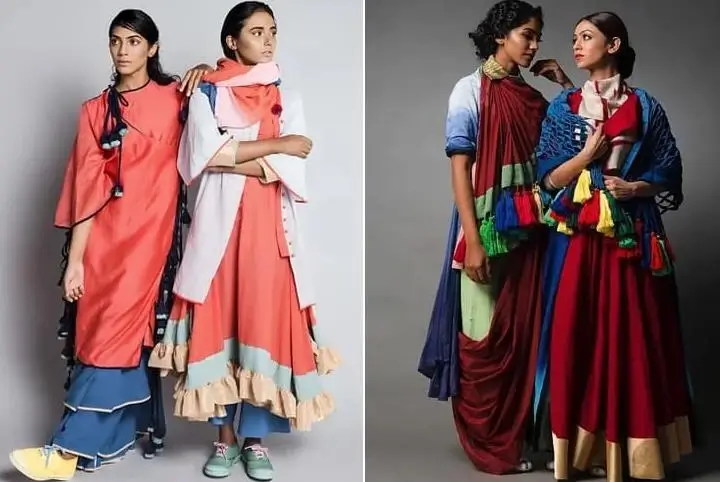Then rise and rise of slow fashion in India and beyond

In a world saturated with fleeting trends and the relentless churn of fast fashion, a quiet but powerful revolution is brewing. The spotlight is shifting. Consumers aware of the environmental and social costs of rapid production cycles are turning towards something more meaningful, more enduring: slow fashion.
This conscious movement, emphasizing quality, ethical production, and mindful consumption, is steadily gaining momentum in India, mirroring a global shift towards a more sustainable approach to clothing.
Slow fashion moves forward
The global sustainable fashion market was estimated at around $6.35 billion in 2020 and is projected to reach $9.81 billion by 2025, growing at a CAGR of approximately 9.1 per cent during the forecast period. Reports indicate an increase in consumer interest in ethical and sustainable brands.
Terms like "sustainable fashion," "eco-fashion," and "conscious consumerism" are gaining traction, reflecting this growing demand.
India, with its rich heritage of handloom textiles, artisanal crafts, and traditional skills, is uniquely positioned to lead this slow fashion revolution. The growth of slow fashion in India is not just an ethical choice; it's an opportunity to revitalize local economies, preserve traditional crafts, and empower marginalized communities.
Growing importance of slow fashion
The importance of slow fashion's growth, both globally and particularly in India, is multifaceted.
- Environmental sustainability: Fast fashion's demand for rapid production relies heavily on resource-intensive processes, leading to significant water usage, chemical pollution from dyeing and finishing, and massive textile waste ending up in landfills. Slow fashion, with its emphasis on durable, high-quality materials and longer product lifecycles, directly addresses these concerns. By promoting mindful consumption and reducing the demand for constantly new items, it lessens the environmental burden.
- Ethical labor practices: The fast fashion industry has often been criticized for poor working conditions, low wages, and exploitation of garment workers, often in developing countries. Slow fashion brands typically prioritize fair wages, safe working environments, and transparent supply chains, ensuring the well-being of the people who make our clothes. In India, this can translate to better livelihoods for artisans and weavers.
- Preservation of craft and heritage: India boasts of diverse traditional textile techniques and artisanal skills passed down through generations. The rise of slow fashion provides a platform for these crafts to thrive, preventing their extinction in the face of mass-produced alternatives. Supporting these artisans not only preserves cultural heritage but also creates economic opportunities in rural communities.
- Empowering local economies: By choosing locally made, handcrafted garments, consumers directly support local businesses and artisans, contributing to the economic growth and stability of their communities. This contrasts with fast fashion, where profits often flow to large corporations, with limited local economic benefit.
- Promoting mindful consumption: Slow fashion encourages consumers to think critically about their purchases, considering the origin, materials, and longevity of their clothes. This shift away from impulsive buying fosters a more conscious and responsible approach to consumption, ultimately leading to less waste and a greater appreciation for the value of clothing.
Building brands in slow fashion
Small clothing brands are at the forefront of the slow fashion movement. Here are a few examples of Indian brands and startups that embody the ethos of slow fashion:
- No Nasties: This Goa-based brand focuses on organic cotton clothing for adults and children, emphasizing fair trade practices and transparent supply chains. Their commitment to ethical sourcing and production has garnered them a loyal customer base. Their business model revolves around direct-to-consumer sales through their website, allowing them to maintain control over their values and customer relationships.
- Doodlage: Doodlage is a Delhi-based brand that upcycles factory waste and surplus fabrics to create unique and stylish clothing. Their innovative approach to minimizing textile waste and their focus on contemporary designs have made them a notable name in sustainable fashion in India. They retail through their own stores and online platforms, showcasing that sustainability can be synonymous with high fashion.
- Mishé: This brand works with artisans across India, celebrating traditional crafts like hand-block printing and natural dyeing. They focus on creating timeless pieces with a contemporary aesthetic, highlighting the skill and artistry of their craftspeople. Their business model emphasizes fair wages and ethical sourcing, positioning them as a brand that values both people and the planet.
- B Label: Part of the Bombay Hemp Company (BOHECO), B Label utilizes hemp textiles to create sustainable and durable clothing. Hemp is known for its low environmental impact, requiring less water and pesticides than conventional cotton. B Label's focus on this eco-friendly material and their commitment to ethical production showcase the potential of innovative materials in slow fashion.
The rise of social media and e-commerce has been a game-changer for small, slow fashion brands. It allows them to bypass traditional retail barriers and connect directly with consumers who resonate with their values. This direct engagement fosters trust and loyalty, crucial elements for building a sustainable brand.
























